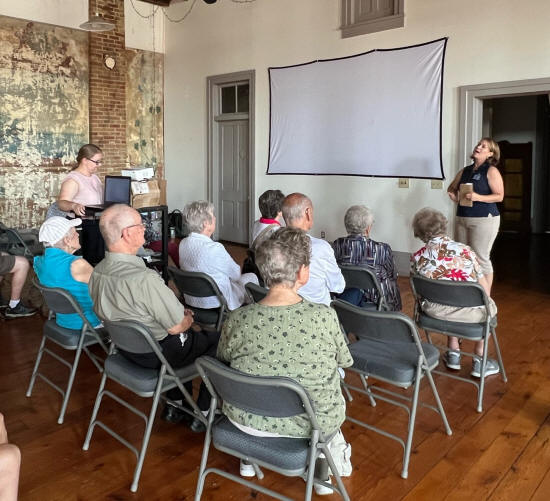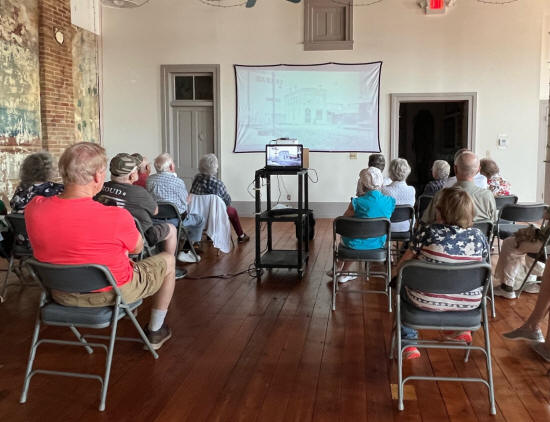|
Looking for Lincoln film recounts
Atlanta barbeque celebrating Emancipation Proclamation 12th
Anniversary
 Send a link to a friend
Send a link to a friend
 [July 30, 2022] [July 30, 2022]
On July 21, representatives of the Looking for Lincoln Heritage
Coalition screened its newest short film titled “1875 Emancipation
Proclamation: A Grand Old-Style Barbeque in Atlanta, Illinois.”
This film focuses on a little-known story from the town’s history.
It is one of a series of videos and podcasts about lesser known
stories connected to Abraham Lincoln. During Lincoln’s time in
central Illinois, he knew many people in Atlanta.
The Looking for Lincoln Heritage Coalition created the short film to
help people “learn about the events and efforts of a small group of
African American citizens from Atlanta, Illinois, who hosted an
area-wide BBQ celebration at their local fairgrounds.”
The event celebrated “The 12th Anniversary of the Emancipation
Proclamation, which granted freedom to the enslaved people of the
United States.”

A poster of the barbeque is in Atlanta’s Union Hall. The film shows
a dance in Union Hall. Varble said that dance may have been in the
very room in which they were screening the film.
One reason Feezor said Atlanta was chosen for the celebration is
that it had the fairgrounds and was located close to the railroad.
People from Springfield, Bloomington and Peoria all converged in
Atlanta for the one-day celebration.
There were about six Black households with a total of 25 people in
Atlanta at that time. The people from these households hosted the
event. They spent days preparing for the celebration, which had
several notable speakers and musical entertainment by an all-black
band.
At the time, the population of Black people in Illinois was 6/10 of
a percent of the population. Varble said that seemed low, but found
it was accurate. That means having a stable African American
population in Atlanta then was unusual.
Some African Americans that came here were Civil War soldiers.

Though there were white people in attendance, many white people in
town looked on as Black families participated in the celebration.
There was so much information Varble said they found when
researching the event.
_small.jpg)
Following the film screening, Steven Varble and Heather Feezor from
the Looking for Lincoln Heritage Coalition gave a short
presentation.
Varble and Feezor discussed the steps involved in the research and
film making process.
First, research was done, and primary documents were collected.
Census records show a small African American population in Atlanta
at that time.
One part of the process involved identifying the story, assembling
the research and images, and then compiling them into a story. A
storyboard is created as they put images with the script.
There were some images of Atlanta, but Feezor she said struggled to
find many photos. Photos of the fairgrounds date from 1900.
Since they did not have a lot of Atlanta images, Feezor said
historians told them that they could just use images from the later
time period. She was told [documentarian] Ken Burns did that all the
time.

[to top of second column] |


Much of the celebration shown was from a different celebration
around the same time. Feezor said they looked for similar images to show what
would have potentially happened.
The process can take a long time. For the video, 20 images were
needed for each minute, so getting the photos takes the longest.
After Feezor finished her part, she sent everything on to Varble. Varble did the
more technological part.
Varble said to put together the video, they first read a script aloud to figure
the length and number of photos needed. He then told Feezor how many photos were
needed to make the video.
One problem Varble said they encountered was having many photos about one
section and no photos for another section.

To read the script, the Coalition wanted an African American narrator. Varble
said they were able to use Reggie Harris. Harris plays a ghost in “Ghosts of the
Museum” at the Abraham Lincoln Presidential Library Museum.
After Harris read the script, everything was put in an audiophile to make sure
it sounded good. Next, Varble said they began dropping in the photos.
When they realized they needed to take out a few photos, Varble said it left a
five second gap. There could not be any gaps in the video. They then went to the
Library of Congress website, which has hundreds of images of Atlanta and other
places.
After searching the internet for music and sound effects, these were added to
create a soundscape.
The work bounces back and forth between team members until all pieces come
together.
Once another team had looked the video over and approved it, Varble said the
video was ready to be launched.
One thing Varble said they discovered during the pandemic is that Looking for
Lincoln has a huge following online. Audiences have really expanded, so they are
making these films available online.
“1875 Emancipation Proclamation: A Grand Old-Style Barbeque in Atlanta,
Illinois” became available on YouTube immediately after the screening.
The next film in the series the Looking for Lincoln Heritage Coalition is
working on is about Susan Richardson. Varble said Richardson was a slave in
Illinois and bought herself out of slavery.
An interesting film that Varble said will be coming up, is about New
Philadelphia. New Philadelphia was the first community in the United States
founded by African Americans. The community was down by Pittsfield, Illinois.
The podcast is done for that one, and Feezor is working on getting photos. The
process of getting photos takes the longest.

Paintings and drawings of events are also sometimes used.
Right now, Varble said they are working on a film about African Americans who
were friends with Abraham Lincoln. Feezor said they are trying to finish that
film.
[Angela Reiners]
Related Links:
“1875 Emancipation Proclamation: A Grand Old-Style Barbeque in Atlanta,
Illinois” Looking for Lincoln
https://www.youtube.com/watch?v=qJCkVk9fGdw
On Atlantaillinois.org go to Discover Atlanta, click on Looking for Lincoln and
then the link under Grand Old-Fashioned Barbecue
Library of Congress website: loc.gov |